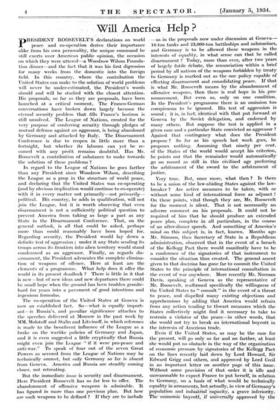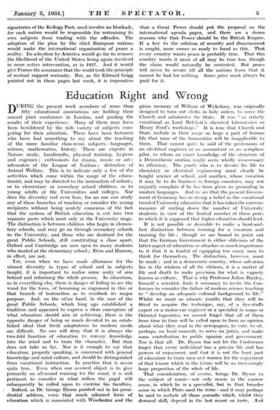Will America Help ?
PRESIDENT ROOSEVELT'S declarations on world peace and co-operation derive their importance alike from his own personality, the unique command he still exerts over American public opinion, the occasion on which they were uttered—a Woodrow Wilson Founda- tion dinner—and the fact that it was his first digression for many weeks from the domestic into the foreign field. In this country, where the contribution the United States can make to the solution of world problems will never be under-estimated, the President's words should and will be studied with the closest attention. His proposals, so far as they are proposals, have been launched at a critical moment. The Franco-German conversations have broken down largely because the eternal security problem that fills France's horizon is still unsolved. The League of Nations, created for the very purpose of conferring security through pledges of mutual defence against an aggressor, is being abandoned by Germany and attacked by Italy. The Disarmament Conference is due to reopen in little more than a fortnight, but whether its labours can yet be re- sumed with any profit remains doubtful. Has Mr. Roosevelt a contribution of substance to make towards the solution of these problems ?
In regard to the League of Nations he goes farther than any President since Woodrow Wilson, describing the League as a prop in the structure of world peace, and declaring that the United States was co-operating (and by obvious implication would continue to co-operate) with it in every matter not primarily—not primarily— political. His country, he adds in qualification, will not join the League, but it is worth observing that even disarmament is not a sufficiently political question to Prevent America from taking as large a part as any State in the Disarmament Conference. That, on the general outlook, is all that could be asked, perhaps more than could reasonably have been hoped for. Regarding security, the President would lay down ' a definite test of aggression ; under it any State sending its troops across its frontiers into alien territory would stand condemned as an aggressor. Finally, as regards dis- armament, the President advocates the complete elimina- tion of weapons of offence. Here at least are the elements of a programme. What help does it offer the world in its present deadlock ? There is little in it that is new—but of new ideas and new departures there could be small hope when the ground has been trodden granite- hard for years into a pavement of good intentions and ingenious formulas.
The co-operation of the United States at Geneva 'is now an established fact. So—what is equally import- ant—is Russia's, and peculiar significance attaches to the speeches delivered at Moscow in the past week by MM. Molotoff and Stalin and Litvinoff, in which reference is made to the beneficent influence of the League as a brake on the warlike policies of Germany and Japan, and it is even suggested a little cryptically that Russia might even join the League "if it were pro-peace and anti-war." To speak of four out of the seven -Great Powers as severed from the League of Nations may be technically correct, but only Germany so far is absent from Geneva. America and Russia are steadily coming closer, not retreating. _ But the immediate issue is security and disarmament. Here President Roosevelt has so far less to offer. The abandonment of offensive weapons is admirable. -It has figured in more than one previous plan. But how are such weapons to be defined ? If they are to include —as in the proposals now under discussion at Geneva- 16-ton tanks and 25,000-ton battleships and submarines, and Germany is to be allowed these weapons in the -interests of equality, in what sense can that be called disarmament ? Today, more than ever, after two years of largely futile debate, the renunciation within a brief period by all nations of the -weapons forbidden by treaty to Germany is marked out as the one policy capable of effecting disarmament and consolidating peace. If that is what Mr. Roosevelt means by the abandonment ,of offensive weapons, then there is real hope in his pro.: nouncement. But even so, only on one condition. In the President's programme there is an omission too conspicuous to be ignored. His test of aggression is sound ; it is, in fact, identical with that put forward at Geneva by the Soviet delegation, and endorsed by many others. But suppose the test is applied in a given case and a particular State convicted as-aggressor ? Against that contingency what does the President propose ? So far as his speech last week goes, he proposes nothing. Assuming that ninety per cent. of the States of the world would accept his criterion, he points out that the remainder would automatically go on record as still in this civilized age preferring the arbitrament of the sword to the arbitrament of justice.
Very true. But, once more, what then ? Is there to be a union of the law-abiding States against the law- breaker ? Are active measures to he taken, with or without some kind of international force as adjunct ? On these points, vital though they are, Mr. Roosevelt for the moment is silent. That is not necessarily an adverse comment on his proposals. It could not be required of him that he should produce an extended peace plan, complete in all particulars, in the course of an after-dinner speech. And something of America's mind on this subject is, in fact, known. Months ago Mr. Stimson, then Secretary of State in a Republican administration, observed that in the event of a breach of the Kellogg Pact there would manifestly have to. be a conference of the signatories of that instrument to consider the situation thus created. The general assent given to that doctrine has gone far to commit the United States to the principle of international consultation in the event of war anywhere. More recently Mr. Norman Davis, speaking at -Geneva as the representative of Mr. Roosevelt, reaffirmed specifically the willingness of the United States to "consult" in the event of a threat to peace, and dispelled many existing objections and apprehensions by adding that America would refrain from any action tending to thwart measures which the States collectively might find it necessary to take to restrain a violator of the peace—in other words, that she would not try to break an international boycott in the interests of American trade.
Even if the United States, as may be the case for the present, will go only so far and no farther, at least she would put no obstacle in the way of the organization of economic pressure, by signatories of the Kellogg Pact on the lines recently laid down by Lord Howard, Sir Edward -Grigg and others, and approved by Lord Cecil in an important letter on another page of this issue. Without some provision of that order it is idle and - unreasonable to expect France to put herself, in relation to • Germany, on a basis of what would be technically equality in armaments, but actually, in view of Germany's population and industrial 'caPacity, a grave inferiority. -The economic boycott, if universally approved by the signatories of the Kellogg Paot, need involve no blockade, for each nation would be responsible for restraining its own subjects from trading . with the offender. The adoption of the plan by -the chief European nations would make the international organization of peace a reality. Its adoption by America would go far to remove „the likelihood of the United States being again involved in more active intervention, as in 1917. And it would give France the assurance that the world took the principle of mutual support seriously. But, as Sir Edward Grigg pointed out in these pages last week, it is imperative -that ,a Great Power should put the proposal on the international agenda paper, and there are a dozen reasons why that -Power should be the British Empire. 'If a key to the solution of security and disarmament is sought, none comes so ready to hand as this. That every country wants peace is probably true. That this country wants it most of all may be true too, though the claim would naturally be contested. But peace will never be secure till all the nations learn that it cannot be had for nothing. Some price must always be paid for it.







































 Previous page
Previous page